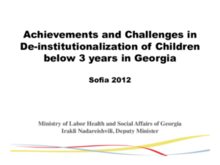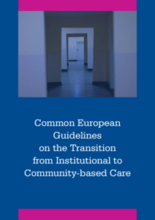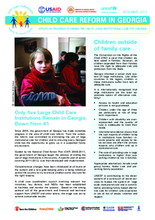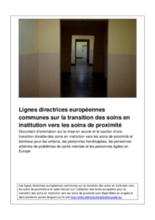Displaying 471 - 480 of 662
This presentation to the 2012 Sofia Conference by Jean-Claude Legrand, Senior Regional Advisor Child Protection, UNICEF CEE/CIS, highlights the situation of children in formal care, with particular concern for children with disabilities, and recommends reform and policy initiatives to improve the childcare systems in Eastern Europe and Central Asia.
This presentation to the 2012 Sofia Conference by Danica Kramarić, Head of Sector for the Promotion and Protection of Health, Croatian Ministry of Health, introduces how positive communication and engaged parenting are key deterrants of the placement of children with disabilities in institutions.
This presentation to the 2012 Sofia Conference by Valentina Buliga, Minister of Labor in Moldova, Social Protection and Family, introduces Moldova's ongoing collaboration between the Ministry of Health and the Ministry of Labor to reduce infant mortality and the placement of children under the age of 3 in institutions.
This presentation to the 2012 Sofia conference by Irakli Nadareishvili, Deputy Minister, Ministry of Labor Health and Social Affairs of Georgia, highlights the key initiatives of the deinstitutionalization and childcare system reform launched by Georgia in 2005, as well as the challenges faced in this process.
The Common European Guidelines on the Transition from Institutional to Community-based Care (‘the Guidelines’) provide practical advice about how to make a sustained transition from institutional care to family-based and community-based alternatives for individuals (including children) currently living in institutions and those living in the community, often without adequate support.
The document highlights the recent child care reform in Georgia under the partnership of the Ministry of Labor, Health, and Social Affairs of Georgia and UNICEF and provides an update on progress of ending the use of large institutions care for children.
Document d’orientation sur la mise en œuvre et le soutien d’une transition durable des soins en institution vers les soins de proximité et familiaux pour les enfants, les personnes handicapées, les personnes atteintes de problèmes de santé mentale et les personnes âgées en Europe.
Hope and Homes for Children, in partnership with the Ministry of Gender and Family Promotion (MIGEPROF), has conducted a national survey of all institutions for children in Rwanda to obtain an accurate picture of the current institutional system and the children living within it which can be used to inform decision-making regarding the implementation of the reform strategy and provide a baseline against which progress can be measured in the future.
In this TED video, Georgette Mulheir, CEO of Lumos, an NGO dedicated to ending worldwide systematic institutionalization, describes how orphanages can cause irreparable damage to children both mentally and physically and urges to end reliance on them by finding alternate ways of supporting children in need.
Care related section of the Government of the Republic of Indonesia's third and fourth combined report on the implementation of the Convention on the Rights of the Child (dated 18th October 2012).









